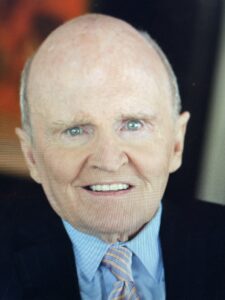By Nance Ebert
Contributing Writer
PITTSFIELD – Businessman Jack Welch rose to fame as the controversial CEO of General Electric, but his roots in Massachusetts were far from the world of boardrooms and the executive C-suite. Born in Peabody to a railroad conductor father and homemaker mother, he graduated from Salem High School and then UMass-Amherst.

Accomplishments amid controversy
General Electric, in its heyday, was a major employer in Massachusetts, particularly in Pittsfield. The company created thousands of well-paying jobs for those in Pittsfield and beyond. When GE closed its Pittsfield facility, it left the community struggling. There is a lot of controversy regarding Jack Welch’s twenty-year tenure as the legendary CEO of General Electric. While he turned the company into one of the most profitable in the world, he created a cutthroat environment that was considered toxic.
According to CNN, “During his twenty years as CEO, Welch increased GE’s scope and added financial muscle to the company. The market value of GE’s stock rose from $14 billion to $400 billion over those two decades, an increase in more than 2700 percent.”
Competitive culture
David Gelles, the author of the book titled, “The Man Who Broke Capitalism: How Jack Welch Gutted the Heartland and Crushed the Soul of Corporate America—and How to Undo His Legacy,” described how Welch engaged in a process called ‘stack ranking.’ This resulted in a very competitive culture.
“Stack ranking was a process where the managers would sort their workers in A, B or C players and twenty percent were top performers, seventy percent were average and ten percent were sub-par.” wrote Gelles. “The bottom ten percent were systemically let go each year. Because tens of thousands of employees were shown the door year after year, workers were afraid for their jobs and colleagues were competitive with one another.”
GE laid off more than 100,000 people in Welch’s first few years as the Chief Executive Officer and sold close to one hundred businesses. He earned the nickname “Neutron Jack,” which was a direct reference to the neutron bomb which kills people but leaves the buildings intact.
Rising through the ranks
Welch worked for General Electric for eight years before becoming the youngest department general manager at the age of 32 when he took over the company’s plastics department in Pittsfield, where he was credited with revitalizing this division. GE sold the plastics division in 2007 to Sabic Industries for $11.6 billion dollars. He enjoyed living in Pittsfield and being a member of the Country Club of Pittsfield.
When he was 43, he then became the youngest vice chairman in General Electric’s history. At the height of the company’s success, GE in Pittsfield employed 13,000 employees. The company did much for the community, including sponsoring youth sports, providing good-paying jobs, funding local charities and was an ever-present entity in the city.
Welch once said, “GE and the community always had a very good relationship. We all liked being out there. We liked the environment of the Berkshires. We supported the city’s charities.”
In an interview with The Berkshire Eagle in 2011, Welch explained the reasons behind closing the power transformer division, which had been losing revenue for some time prior to having it closed. By the time of his 2001 retirement, he had grown General Electric to over $450 billion in market capitalization.
Toxic environmental legacy
It has been noted that during part of his tenure, GE polluted the Housatonic River and properties in Pittsfield with PCBs from its transformer division. For decades, Welch battled the Environmental Protection Agency as well as New York State over PCBs that were dumped into the river to keep machinery from overheating. The chemicals that were dumped led to extensive contamination around Pittsfield as well as down the entire Housatonic River.

Photo/Wikimedia Commons/John Phelan
Chemicals were also dumped into the Hudson River at its capacitor product division in Hudson Falls, New York, contaminating the surrounding aquifers as well. Welch did not believe the science that condemned PCBs as carcinogenic.
For decades, General Electric was Pittsfield’s largest employer, often providing income for more than one generation of some Pittsfield families. Jack Welch’s legacy remains controversial and while he made a lot of money for the company, retirees and stockholders, towns in the Berkshires are still feeling the ill effects of the contaminated Housatonic River and the plight to clean it up.
Jack Welch died from kidney failure at age 84 at his home in New York City, on March 1, 2020.
RELATED CONTENT:
Former business executive now championing the cause of ‘conscious capitalism’












